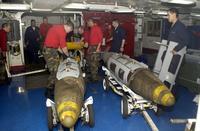-
Wrong crowd: social networks are key to city violence
A new study of gun violence in Chicago reveals that a person’s social network is a key predictor in whether an individual will become a victim of gun homicide, even more so than race, age, gender, poverty, or gang affiliation. “Risk factors like race and poverty are not the predictors they have been assumed to be,” one of the researchers said. “It’s who you hang out with that gets you into trouble. It’s tragic, but not random.”
-
-
Drive-by charging: Advancing wireless power transfer for vehicles
Researchers have developed new technology and techniques for transmitting power wirelessly from a stationary source to a mobile receiver — moving engineers closer to their goal of creating highway “stations” that can recharge electric vehicles wirelessly as the vehicles drive by.
-
-
The Philippines is victim of geography, poor infrastructure, poverty
Owing to its location and geography, the Philippines is one of the most natural disaster-prone countries in the world. On average the country experiences nine major typhoons and 900 earthquakes annually, and it has twenty-five active volcanoes. Poor infrastructure and pervasive poverty exacerbate the impact of disasters, making them even more deadly and destructive. “In a cruel cycle, poverty and underdevelopment make disasters worse, and disasters make poverty and underdevelopment worse,” one observer notes.
-
-
Past as prologue: Insights from past natural disasters relevant today
The increasing frequency and intensity of natural disasters constitute a daunting challenge to modern society, which is characterized by a heavy infrastructure and increasing population density. Until now, coping with natural disasters has involved expensive state intervention and technology-aided approaches, but researchers believes that the past contains a wealth of unexploited resources which could also provide solutions to the problems communities face when dealing with need to cope with, and recover from, natural disasters.
-
-
Rochester, Minn. wants to stop crime before it happens
The Rochester Police Departmentin Rochester, Minnesota is using IBM’s Infosphere Identity Insightto predict, and combat, crime. InfoSphere Identity Insight is used to identify frequent crime offenders, and even when multiple false identifications belonging to one individual are stored on record, the associated relationships of those identities could lead to the correct individual.
-
-
The Ergonomics of bomb-making at sea

In an effort to stem work-related injuries and speed the assembly of munitions aboard aircraft carriers, the Office of Naval Research (ONR) spearheaded the development of a more efficient and ergonomic way to build bombs at sea. The ONR-sponsored improvements will allow sailors to move around more freely and assemble multiple bombs simultaneously on smaller, individual stands.
-
-
Sequestration already eroding U.S. research capabilities
As congressional budget leaders continue negotiations over Fiscal Year 2014 spending levels, three organizations representing the U.S. leading public and private research universities say that the results of a new survey reveal the pernicious impact of sequestration on scientific research across the country. Budget cuts have already led to fewer grants, cancelled projects, staff reductions, and reduced learning opportunities. “If Congress fails to reverse course and doesn’t begin to value investments in research and higher education, then the innovation deficit this country is facing will worsen as our foreign competitors continue to seize on this nation’s shortfall,” the leader of one of the organizations said.
-
-
Climate scientists say renewables are not enough
Some of the world’s top climatologists have declared their support for nuclear energy as a complementary energy source, alongside wind and solar as energy, which would cut fossil fuel pollution and reduce the growth of global warming. The scientists say that opposing fossil fuels and promoting renewable energy sources offer but a limited solution.
-
-
Emulating stingray movement to build next generation of submarines
Stingrays swim through water with such ease that researchers believe that emulating the fish’s unique way of swimming could improve deep-sea vehicles’ agility and fuel efficiency. “Most fish wag their tails to swim. A stingray’s swimming is much more unique, like a flag in the wind,” says one researcher.
-
-
Insects’ way of flying inspires design of tiny flying robots
Researchers have identified some of the underlying physics that may explain how insects can so quickly recover from a stall in midflight — unlike conventional fixed wing aircraft, where a stalled state often leads to a crash landing. The analysis improves the understanding of how insects fly and informs the design of small flying robots built for intelligence gathering, surveillance, search-and-rescue, and other purposes.
-
-
Chevron contributes $1.5 million to new engineering education initiative
Chevron has contributed $1.5 million to a new National Academy of Engineering (NAE) initiative that will provide expert, research-based guidance to those involved in overseeing engineering education in kindergarten through grade 12. The initiative will create a clearinghouse of curriculum materials and resources and connect engineering education experts with teachers, administrators, and others involved in providing engineering experiences to K-12 students.
-
-
Philippines prepares for worse disasters to come
On average, the Philippines experiences about twenty typhoons a year, including three super-typhoons and many incidents of flooding, drought, earthquakes, tremors, and occasional volcanic eruptions, making the country one of the most naturally disaster-prone areas in the world. Filipino government agencies, with the help of international disaster and relief agencies, have created new strategies for disaster preparedness, response, and mitigation which may well have potential applications in other parts of the world. As the impact of climate change grows more pronounced, the Philippines is becoming a hothouse for developing new methods and systems in the growing business of disaster relief.
-
-
Advanced police surveillance technologies pose significant privacy concerns

Much of the attention on surveillance in the media focuses on the National Security Agency (NSA), but there is not a lot of scrutiny on local domestic surveillance. In 1997, about 20 percent of police departments in the United States used some type of technological surveillance. By 2007, that number had risen to more than 70 percent of departments. Experts in criminal law and information privacy warn that the widespread use of advanced surveillance technologies such as automatic license plate readers, surveillance cameras, red light cameras, and facial recognition software by state and local police departments, combined with a lack of oversight and regulation, have the potential to develop into a form of widespread community surveillance, which ought to pose significant privacy concerns to law-abiding citizens.
-
-
Sunlight-activated nanogrid breaks down pollutants in water
Oil spills do untold damage to the environment — to the waters they pollute and to marine and other wildlife. The Deepwater Horizon spill in the Gulf of Mexico in 2010, for example, the largest accidental marine oil spill in the history of the petroleum industry, flowed unabated for three months. Typically, such oil spills are extraordinarily difficult to clean up. Soon, however, the process may become infinitely easier and ecologically friendly, the result of a new invention — “nanogrid” — a large net consisting of metal grids made of a copper tungsten oxide, that, when activated by sunlight, can break down oil from a spill, leaving only biodegradable compounds behind.
-
-
U.S. Navy dominates competition for number, quality of patents
The IEEE evaluated more than 5,000 organization patent portfolios, across the seventeen industry sectors evaluated in its scorecard, for the number of patents issued as well as the growth, impact, originality, and general applicability across their respective portfolios. A laser with the potential to jam heat-seeking missiles and sniff out chemicals was one of 358 technologies patented by the U.S. Navy in 2012, helping the service dominate the government category in an annual ranking of patent portfolios published 23 October. It is an achievement the Navy has held since the scorecard added the government category in 2008.
-
More headlines
The long view
New Technology is Keeping the Skies Safe
DHS S&T Baggage, Cargo, and People Screening (BCP) Program develops state-of-the-art screening solutions to help secure airspace, communities, and borders
Factories First: Winning the Drone War Before It Starts
Wars are won by factories before they are won on the battlefield,Martin C. Feldmann writes, noting that the United States lacks the manufacturing depth for the coming drone age. Rectifying this situation “will take far more than procurement tweaks,” Feldmann writes. “It demands a national-level, wartime-scale industrial mobilization.”
How Artificial General Intelligence Could Affect the Rise and Fall of Nations
Visions for potential AGI futures: A new report from RAND aims to stimulate thinking among policymakers about possible impacts of the development of artificial general intelligence (AGI) on geopolitics and the world order.
Smaller Nuclear Reactors Spark Renewed Interest in a Once-Shunned Energy Source
In the past two years, half the states have taken action to promote nuclear power, from creating nuclear task forces to integrating nuclear into long-term energy plans.
Keeping the Lights on with Nuclear Waste: Radiochemistry Transforms Nuclear Waste into Strategic Materials
How UNLV radiochemistry is pioneering the future of energy in the Southwest by salvaging strategic materials from nuclear dumps –and making it safe.
Model Predicts Long-Term Effects of Nuclear Waste on Underground Disposal Systems
The simulations matched results from an underground lab experiment in Switzerland, suggesting modeling could be used to validate the safety of nuclear disposal sites.
